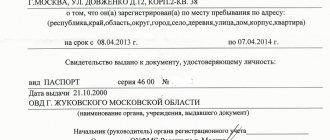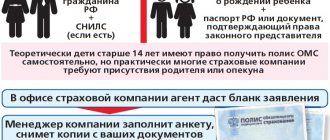What is the need
For government agencies, registration is the simplest and most accurate method of census.
In this way, data is collected on how many people currently live in the region/country. Registration in everyday life is mistakenly confused and identified with registration, however, the former was introduced in the USSR to influence the migration of citizens within the country.
A person could register in a particular city only on a certain basis - for example, a job assignment or the presence of a spouse who already had a “registration” stamp (for this reason, fictitious marriages were even popular). But government agencies had the right to refuse registration - that’s how the regulatory machine worked. The procedure was canceled only in 1990 - thus the authorities recognized that it restricted the freedom of movement of citizens.
Registration is a thing of the past, but the term remains - it is incorrectly called registration. The main difference is that the latter is of a notification rather than a compulsory nature. That is, a person must simply officially notify the authorities that at the moment he plans to live or temporarily (more than 3 months) stay in a specific locality.
According to the law, lack of registration should not interfere with receiving social assistance, as well as medical care and education. However, in practice, many institutions require registration, in particular:
- upon admission to kindergarten, school;
- attachment to a clinic, treatment;
- registration of documents (foreign passport, driver’s or pension license);
- when applying for a loan;
- receiving social support.
In addition, registration is necessary to confirm your place of residence.
What happens if the registration expires?
As such, the concept of “overdue registration” does not exist in the legislative acts for 2021, and therefore, it is impossible to impose a fine on this basis.
However, this concept means the absence of any registration at the moment. That is, a citizen is discharged from his previous place of residence, and is registered at a new address after a certain time. During this period of time a person actually lives without registration.
The time allotted for registration at a new address is 90 days.
It is necessary to renew the registration before the end of the period, otherwise there will be a fine for “overdue registration”.
The period for registration is established solely in relation to temporary registration. Permanent registration does not require re-registration or extension.
Legislative basis: how long can you walk without registration
This issue is regulated by several codes, federal laws and regulations. Thus, the Civil Code documents the very fact that it is necessary to register. Administrative legislation provides for sanctions against violators and the amount of fines for different areas. The Housing and Family Codes define more specific everyday situations. They present standards related to the residence of children, as well as procedures for various types of real estate, for example, municipal ones. More detailed rules and regulations can be obtained from Federal Law No. 5242-1 and from Government Decree No. 713. They regulate:
- which bodies deal with this issue and have the authority to register citizens;
- a list of papers that need to be collected;
- timing and method of carrying out the procedure, order;
- How many days can you go without registration?
In what cases can a fine not be imposed?
Lack of registration is not in all cases a prerequisite for imposing penalties:
- In addition to children, the list of persons whom the owner may not register also includes spouses, parents, grandchildren, and grandparents.
- If a citizen is registered at a permanent place of residence in the same locality where he actually lives, then he does not have to register at the second address.
In addition to the populated area, this rule also applies to the subject of the federation. For example, a citizen is registered in the Moscow region, but lives in Moscow. In this case, even if he does not have temporary registration in his passport, the fine does not apply to him.
Without a mark in the passport
During the Soviet Union, the fact that you were registered was confirmed by a stamp on the main identity document.
In Russia, this rule has been retained, however, there are situations when this is impossible or impractical.
- The child has not reached the age of 14, which means he does not yet have a document. His main identification document for now is a birth certificate, but there is no corresponding mark on it. However, this does not mean that the baby is not registered. It is usually prescribed at the place of residence of one of the parents.
- Temporary registration, which is done on a separate sheet.
- Lost or replaced passport. In this situation, the citizen is also not left without an identity card; he is issued a corresponding certificate that the document is being replaced. If necessary, a paper confirming registration is taken for this period.
Nuances of registering a child
A newborn child must be registered with one of the parents, usually the mother.
This must be done immediately after receiving the birth certificate. Otherwise, the same fines are provided as for ordinary citizens.
However, there are controversial points in the legislation in force for 2021 regulating the procedure for registering a newborn child, its deadlines and fines for late registration.
The Code of Administrative Offenses of the Russian Federation places responsibility on citizens who have reached the age of 16. A newborn is not one, and therefore cannot bear this responsibility. It is also impossible to impose a fine on parents, since they have registration.
In this case, employees of the Federal Migration Service appeal to Article 19.15 of the Code of Administrative Offenses of the Russian Federation. Some require the child to be registered within seven days.
According to Art. 19.15 of the Code of Administrative Offenses of the Russian Federation, liability for the lack of registration of persons who are related and living in the same premises is not provided. Parents and children are on this list. Therefore, there is no penalty in this case.
Is it possible to be in Russia without registration: how long is a person allowed to live without registration?
It is not possible to completely control the migration issue. There are always people who live in one locality but are registered in another. In addition, there are foreign illegal migrants. Moreover, there are often people who do not have a passport or their own home. How legal is this?
Our compatriots clearly have the right to move freely around the country without confirmation of the route. Travelers, guests, as well as people who come for work or study for a short period of time, tourists transiting through a populated area - all of them can temporarily reside in the city without registration. But if they want to stay longer, then they should consider registering their stay.
As for foreign citizens, they can also stay on the territory of the Russian Federation for a short time, for example, during vacation. However, you will need an appropriate document for residence if this is a long international business trip or exchange training. In addition, there are numerous boarding houses and hotels that provide this service - they provide temporary registration to their guests.
Separately, it is worth noting newborns. The child does not have to be registered immediately after birth. Young parents have time to sort out all organizational issues. Moreover, the main documents for the baby, that is, a birth certificate, compulsory medical insurance policy, SNILS, can be obtained without a mark from the passport office.
If the parents have permanent registration in city A, but at the time of birth the woman is in locality B (and registered there temporarily), then there is no need to urgently go back to register the newborn. It is enough to give him the same certificate.
Registration periods for permanent and temporary residence
It is worth considering that the procedure for registering at a new place of residence differs depending on the form of registration. The time during which Russian citizens have the right to reside at a specific address is established individually by representatives of the FMS and depends on the submitted package of papers.
There are deadlines for which a person is registered as long as possible. After the expiration of the registration, it is necessary to arrange its renewal, and for foreigners to apply for a residence permit or leave the territory of the Russian Federation.
How long can a citizen of the Russian Federation live without registration?
In the USSR, it was necessary to re-register for everyone who was in a “foreign” city for more than a month and a half. In Russia, until 2005, the period of stay in a populated area without registering was seven days, after which the state authorities obliged the person to register. Now this period has been increased to three months.
You can stay with relatives for up to 90 days, go on tourist trips, or stay at your dacha all summer. But then you need to notify the authorities about your change of residence - go to the MFC, submit an application through the State Services portal, or take a coupon to the representative office of the Ministry of Internal Affairs dealing with migration issues.
Many life situations are tied to the period of residence without registration, for example:
- You can be assigned to a clinic at your new place of residence for free once every three months;
- when receiving social assistance, it is necessary to notify the social security authorities when leaving the region for more than 90 days, etc.
Stamp in the passport
Registration is accompanied by an appropriate seal and mark. Such a sign is indefinite; its effect can be canceled only if the person is discharged from the house/apartment. When you collect documents for the Ministry of Internal Affairs department, you give the originals. In return, the employee will give you a receipt for the list of papers and indicate the period of residence for Russian citizens without registration at the place of residence while the passport is in use. As a rule, we are talking about three days, but by law it cannot exceed seven days. In case of pre-registration and low workload of the organ, it is likely that the procedure will take place in 15-20 minutes. If you contact the MFC, the waiting time may increase by one or two days - this is the intermediary’s work time and the transfer of documents.
An alternative to a mark in the passport can be a certificate of the established form. It is issued when a person registers at the place of stay, not residence.
How long can Russian citizens go without registration after selling an apartment?
A common situation: the living space in which a specific person was registered is for sale. New owners and residents will be registered on the living space. And the former owner has only one thing left to do - deregister and within three months find housing where he can register. If during this time a person does not buy a new apartment, then one of the options remains:
- temporarily live with relatives and friends;
- check into a hotel or hostel;
- rent living space.
Many tenants are unaware that the landlord is required by law to register the tenant's occupancy. This is carried out within the same period - 90 days from the date of conclusion of the contract. Therefore, it is very important to look for an official apartment rental.
How many days can you not register after discharge?
Many people mistakenly assume that the three-month period is counted from the moment of departure from the city of residence, but in fact - from the moment of arrival. This fact can be confirmed, for example, by travel tickets. It is more difficult for law enforcement officers to check people driving their own personal vehicles.
Thus, you can check out, then come to the region of your stay and register only within 90 days. But, thanks to electronic document management, a citizen of the Russian Federation is free to deregister immediately at the time of new registration.
How long can you not be registered: how to be in another city without registration
If you live in the same locality, but at a different address, then this information does not need to be provided to the migration department. But if you plan to move for a long time, you should register. For permanent residence, it is best to register permanently, while temporary registration is suitable for:
- long business trip, internship;
- studying and living in a hostel/rented apartment;
- caring for sick or elderly relatives and other situations requiring a long stay - more than three months.
Temporary status can be issued for a different period (most often a year), and then extended, but not more than five years in total, since this will already be assessed as permanent residence.
How to legalize your stay at your place of residence while you are without registration
What needs to be done to obtain temporary registration? Submit an application online on the State Services portal or in person at the branch, and then visit the MFC or the nearest department of the Ministry of Internal Affairs, provide the original documents:
- passport;
- a statement signed by the owner of the property;
- papers confirming ownership of real estate.
In some cases, department specialists may ask for a military ID, registration certificate, departure sheet, marriage or birth certificate, and other documents.
How to live in the Russian Federation for foreigners
If Russian law provides for free movement around cities for its citizens, then foreign guests must register their arrival if they plan to stay in Russia for more than seven days. If a resident of another country comes to stay with friends or relatives, the receiving party is obliged to contact the MFC and notify the authorities about the foreigner’s residence.
If crossing the border is provided for by an employment contract or educational contract, then these procedures are carried out by the employer or the host university, respectively.
If foreign guests are simply traveling around Russia, hotels, hotels, hostels, boarding houses and sanatoriums must register their stay.
Deadline for registration at place of residence after discharge
7 days is the legally established period for citizens to register a new permanent registration from the moment of discharge and arrival at the facility - a new place of residence.
If the period of residence in another city exceeds 90 days, the person is required to obtain temporary registration, limited to a specific period.
At the same time, there is no need to deregister at your permanent place of registration.
How can it even happen that a person does not have registration?
If a person does not have a current mark in his passport indicating his place of residence
, his relationship with government mechanisms in some situations becomes significantly more complicated, and in others it stops altogether.
There are actually quite a lot of reasons why a person may be left without registration. A person may voluntarily de-register with the intention of registering elsewhere. However, for some reason (for example, family reasons), I was unable to register at the new place.
Various fraudulent schemes are also rumored
, as a result of which a citizen may lose not only registration, but also his apartment.
Apartments of lonely and elderly people are traditional targets for attackers. The scammers’ scheme of action is usually as follows: elderly and lonely people are taken into confidence and, at the right moment, are asked to sign legal papers that are passed off as an “employment contract” or “an application for humanitarian assistance.” After which the victim ends up on the street or in a nursing home.
Or, for example, another case. A citizen bought an apartment and registered at his place of residence
. However, after some time it turned out that the seller of the apartment was a mentally ill person. Such a deal can be challenged in court, for example, by his heirs. And as a result, a citizen may find himself on the street without an apartment or registration.
Who and when is exempt from liability for late registration?
A number of situations in which sanctions will not be applied:
- If you are registered at one address and live at another, but within the same locality.
- When registering in Moscow, you can live in the Moscow region, the same applies to St. Petersburg and the Leningrad region.
- When a citizen of the Russian Federation lives in a residential building located in Sevastopol or in one of the populated areas of the Republic of Crimea.
- Penalties can be avoided by setting out mitigating circumstances in writing and securing them with appropriate documentation (for example, the fact of establishing kinship).
The law requires at least temporary registration. Read our articles about whether you can get a job if you don’t have a residence permit and where you can register if you don’t have your own home.
Registration assigns an individual to a specific living space and provides the right to reside. The legal stay of citizens in the locality is monitored by the authorities, so it is better not to overstay documents or delay the registration process, then the risk of falling under sanctions is reduced.
Registration and registration - a fundamental difference
The word “propiska” itself is used only in everyday life; it has been firmly established in the colloquial language since the times of the Soviet Union, when registration was a mandatory condition for a citizen to live in a certain territory. But from a legal point of view, at the moment such a concept no longer exists.
Conclusion of the Committee of Constitutional Supervision of the USSR dated October 26, 1990 No. 11 (2-1) “On legislation on issues of registration of citizens” and then Conclusion of the Committee of Constitutional Supervision of the USSR dated October 11, 1991 No. 26 (2-1) “On the licensing procedure registration of citizens”, it was recognized that the provisions on registration, obliging citizens to obtain permission from internal affairs bodies or other government bodies to reside in all settlements on the territory of the USSR, limit the right of citizens to freedom of movement and freedom to choose their place of residence.
Registration in Russia was formally abolished on October 1, 1993
since the entry into force of the Law of the Russian Federation of June 25, 1993 No. 5242-1 “On the right of citizens of the Russian Federation to freedom of movement, choice of place of stay and residence within the Russian Federation.” Nowadays registration does not officially exist in Russia; it has been replaced by the concept of registration.
At the same time, as the legislator justifies, these institutions have a fundamental difference: registration was a kind of permission to reside in a certain territory, while registration is of a notification nature
.
At the same time, in essence, registration is the responsibility of a citizen, and not his right, since the law states that citizens of the Russian Federation are required to register at their place of stay and place of residence within the Russian Federation within the time limits established by law.
Fulfillment of this obligation is ensured, not least by administrative measures.
, living at the place of residence and at the place of stay without registration may entail the imposition of an administrative fine on citizens in the amount of two thousand to three thousand rubles; for tenants, owners of residential premises (individuals) - from two thousand to five thousand rubles; for legal entities - from two hundred and fifty thousand to seven hundred and fifty thousand rubles.
How long can you occupy living space by law?
Let's first understand the situation: the old owner sold the apartment, but is in no hurry to move out. Is this legal and how much space does he have the right to occupy?
Article 556 of the Civil Code of the Russian Federation states that the transfer of real estate by the seller and its acceptance by the buyer is carried out according to a transfer deed or other transfer document signed by the parties. That is, the transfer of housing from the seller to the buyer must be formalized with a special document , which will specify the terms of the transfer at the discretion and as agreed by both parties.
Reference! Typically, the transfer period should not exceed 21 business days (or 1 month) from the moment of state registration of the buyer’s property rights and payment of the full cost of the housing.
Article 314 of the Civil Code of the Russian Federation states: “... when the deadline for fulfilling an obligation is determined by the moment of demand, the obligation must be fulfilled within seven days from the date the creditor presents a demand for its fulfillment...”. We can say that in this case the presentation of a demand by the buyer is the condition that determines the period for fulfilling obligations.
We can say that in this case the presentation of a demand by the buyer is the condition that determines the period for fulfilling obligations. At the same time, Part 2 Article 314 of the Civil Code. RF. states: “... If the creditor fails to present a demand for the fulfillment of such an obligation within a reasonable time, the debtor has the right to demand that the creditor accept the fulfillment, unless otherwise provided by law, other legal acts, the terms of the obligation, or is clear from customs or the essence of the obligation...”. Of course, it is difficult to focus on this concept, since it has a vague, unclear form.
The time required for the following actions can be counted towards this period:
- extracts of all residents;
- collecting things;
- resolving issues related to new living space;
- removal of things and departure of former owners.
Lawyer Anton Shcherbak comments. “The situation is quite unusual. It is customary to allow the former owner one calendar month to vacate the apartment. These terms must be specified in the purchase and sale agreement.”
Eviction process
When do you need to vacate the living space after the sale and deregistration? There are no legal deadlines for the release of real estate . Therefore, it is necessary to carefully consider drawing up a purchase and sale agreement, which will specify the terms for vacating the home by mutual consent of the buyer and seller.
The best option is considered to be 14-30 calendar days, that is, two weeks to a month. However, everything is decided on a contractual basis and it is desirable that this agreement be reflected in the document for the protection of both parties.
If for some reason the seller has not vacated the premises and the buyer has not accepted the living space and more than one month has passed, the buyer/seller may apply to a judicial authority to evict the seller or to accept the housing. True, if we take into account the waiting time for court hearings, subsequent paperwork, additional monetary costs for a lawyer and moral distress, it is advisable to resolve this issue through peaceful negotiations.
Responsibility for violation of rules and delay
Law enforcement agencies and the border service monitor compliance with population migration norms. The legislation has simplified the procedure for obtaining registration, making it free for citizens of their country, but many neglect this, therefore, if the registration requirements or deadlines are not met, a fine may be imposed in accordance with the Administrative Code of the Russian Federation (Article 19.15.2. and Article 19.15.1. Code of Administrative Offenses of the Russian Federation).
What fine will I have to pay?
Let us dwell in more detail on what the fine is if a person does not register on time. The fine for late registration is established in accordance with the regulations of the Code of Administrative Offenses of the Russian Federation. The amount of the fine imposed for overdue registration at the place of residence varies from 2 to 7 thousand rubles, depending on the region. Those who did not register within the 7 days allocated for registration are also subject to sanctions.
Foreign citizens who lack at least temporary registration may face a ban on entry into the country and immediate deportation. Sanctions also apply to people who allow a person to live in their home without permanent registration.
Legal entities also fall under administrative punishment if they provide housing for the illegal stay of citizens without registration. If they have overdue registration at their place of residence, the fine will range from 300 to 800 thousand rubles.
Terms and procedure for payment of fines
After the administrative violation decision comes into force, you will have 60 days to pay the fine. Today they provide a unique indicator (account) to which you can transfer funds. There are several ways to pay off debt:
- Go to the bank and pay at the cashier.
- Pay via the Internet, including through Sberbank-online or State Services.
- Use the self-service terminal.
Keep the receipt after payment in case there is a failure in the system, you will be able to prove that you are right.
How to pay a fine
The commission of an offense, as well as the punishment for it, is recorded in the protocol, and in case of fictitious registration - in the court verdict.
After the documents enter into legal force, the offender must pay a fine. To do this, you must have payment details or a scanning ID and select one of the following methods for transferring money:
- payment at a bank at a cashier, through a terminal or online banking services;
- transfer at a Russian Post office;
- payment through a terminal at the police department of the Ministry of Internal Affairs;
- online using payment ID.
By the way, at State Services it is possible not only to make payments using a bank card, but also to repay debt with money from an electronic wallet and from a phone.
After payment, we recommend keeping the receipt to avoid possible disputes about repayment of the fine.
Find out more about how to pay a fine for failure to register at your place of residence.











